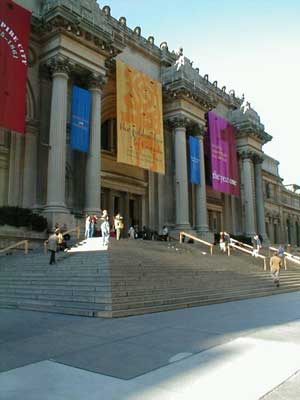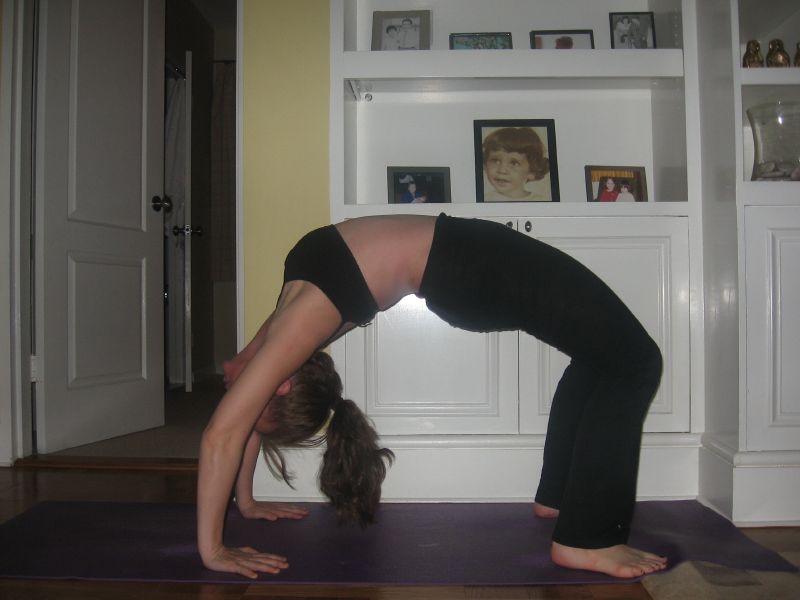And you shall tell your children, "When I left the bonds of slavery, God performed miracles...for me...."
Previously, on "Yoga Chickie's Passover Story": Joseph, son of Jacob and Rachel, became acquainted with the Pharoah through a prank by his jealous siblings. Ultimately, Joseph's good relationship with the Pharoah was a boon for the Jewish people who lived in Egypt. That is, until generations passed and there came into a power a Pharoah who had no knowledge of this Joseph person. Things went downhill fast for the Jews in Egypt, as the Pharoah compelled them into hard labor such as construction work, and without proper pay. The Jews became slaves. And yet still, their numbers multiplied, and the Pharoah went from hatred to fear and round and round again, ultimately commanding that each Jewish boy that was born must be killed. Well, a certain mom wasn't having what the Pharoah was serving. Her name was Yocheved, and she was the mother of Miriam and Aaron. Following Pharoah's death-to-Jewish-newborn-boys decree, Yocheved gave birth to a second baby boy. For as long as she could, Yocheved hid her baby, but really, how successful can anyone be at hiding a baby? When she could hide him no longer, she put her baby in a basket and floated him down the river, where he was found by the Pharoah's daughter. Goaded on by Miriam, Pharoah's daughter took the baby in as her own (despite realizing that he is a Jewish baby) and hired none other than Yocheved to be his baby nurse. The baby became known as Moses (in Hebrew, Moshe, which means, "drawn from the water"), and he grew up in Pharaoh's palace.
Moses was lucky to have his real mom as his nurse for those formative years - the years from zero to three. He became a compassionate man, one who could not bear to see the Jews suffering. One day as an adult, he sees a Jewish man being savagely beaten by his Egyptian taskmaster and in defending the Jewish man, ends up killing the Egyptian. Moses panics and tries to hide the body. But it become quickly apparent that someone told someone, who told someone, what Moses did. Realizing that he is going to be in terrible trouble for killing an Egyptian, Moses runs away.
For many years, Moses stays away. He makes a home in Midyan, marries a beautiful woman wo is the daughter of the Midyan spiritual leader, Yitro. Moses's wife is named Tziporah (as in Tzippy & Ric, whose sweater I am wearing as I write this). Moses becomes a shepherd and has two children. While Moses is gone from Egypt, things only get worse for the Jews in Egypt.
One day, in the midst of all of this, Moses is minding his own business, shepherding some sheep, when he sees a burning bush. The thing about this burning bush though: it burned, but it was not consumed. It was then that God spoke to Moses and told him that he would be God's messenger to bring the Children of Israel (the Jews) out of bondage and into the Promised Land.
"But I'm not worthy," Moses replies.
God doesn't take no for an answer, of course, and instructs Moses to go to Egypt to tell the Jews to make demands upon the Pharoah, demands that the Pharoah will inevitably refuse.
"But who is going to listen to me?" Moses protests.
"Why, everyone, when you show them these three miracles you're going to have up your sleeve. First, you're going to throw your staff to the ground, and it is going to turn into a snake. When you grab the snake by its tail, it will go back to being a staff. Second, you're going to put your hand on your chest, and suddenly, your hand is going to look all gross and diseased. Then you're going to wave your hand and make it look normal again. Then, finally, if still no one believes you, you will fill a pail with water from the river, and when you pour the water out, it will turn to blood."
"But, I have a pretty serious speech impediment. Have you considered that?"
(It has been said that Moses's speech impediment came from an incident in his childhood, when he was "tested" to see if he could live in the Pharoah's palace, by having to choose between a piece of gold and a piece of coal (choosing the gold would mean he posed a threat, in which case, he would be killed); although he started to go for the gold, an angel is said to have moved his hand to the coal, which he popped into his mouth, causing a serious burn and a lifelong speech issue. This story is a folktale, and not from any biblical source.)
"Yes, I've got that worked out. Your brother, Aaron, will go with you, and he will speak for you."
And so it comes to pass that Moses and Aaron go to Egypt and do what God said that they must do. When the demands upon the Pharoah are made, the Pharoah responds as God knew that he would, by saying, "Absolutely NOT" and imposing even harsher measures upon the Jews. The Jews become annoyed with Moses. You had to know it wasn't going to go smoothly. The Jews accuse Moses and Aaron of just making everything worse. Moses tries to tell them to be patient, that everything will work out.
"Yeah? Tell that to the blisters on my hands. Tell that to the sunburn on my neck."
Moses is bummed out. If his own people won't trust him, that God is on their side, that their freedom is God's will, then how will he convince Pharoah to make it all happen?
Well, of course, God had a plan. And it seemed at first to make no sense. Why would anyone want to provoke Pharaoh's anger when he would only turn around and make life even harder for the Jews? But there's the rub: not only were the Jews going to go free, but in the process the Pharoah was going to end up bringing upon himself and his own people the wrath of God. The wrath of God would come in the form of the Plagues.
The more Pharoah said "NO!" I will NOT let your people go", the worse the plagues became. First there was blood - the Nile became a river of blood that made the fish die, and stank to high hell. This had the effect of forcing the Egyptians to purchase water from the Jews. Heh!
Then came the frogs. As the children's song goes, "One day King Pharaoh woke up in his bed, there were frogs on his head, frogs on his bed, frogs on his nose, frogs on his toes, frogs here, frogs there, frogs were jumping everywhere." But still the Pharaoh said, "NO! I will NOT let your people go." (Well, first he said, OK! UNCLE!! But then as soon as the frogs were gone, he went back on his promise to let the Jews go.)
(And this was kind of understandable since a plague of frogs isn't even all that impressive, since it has been documented that in really really big storms, frogs can be swept up in the wind, eventually falling to the earth when the wind dies down, thus giving the appearance of the sky "raining frogs")
Next came lice. Still, the answer coming from Pharaoh: NO.
Then came wild beasts, roaming the streets, mauling the Egyptians. No movement on the part of Pharoah. Then came cattle blight. Pharoah weakens and agrees to Moses's terms. But as soon as the cattle get healthy, Pharoah goes back on his deal. e fifth plague, all of the Egyptian cattle dies. But Pharoh still doesn't budge.
The sixth and seventh plagues were boils which covered his people from head to toe and hail so large it crushed people under it. Notwithstanding the suffering of his own people, Pharoah still will not budge The eighth and ninth plagues were locusts and darkness. Only the Jews had light during the six days of darkness that followed. Pharoah starts to negotiate, suggesting that the Jews can leave Egypt but they have to leave behind their valuables. No deal.
And that was the Pharoah's last chance. The next plague was to be "Death of the Firstborn Son". But this was only to apply to the firstborn sons of Egyptians. Jewish sons would be spared because the angel of death would "Pass Over" all Jewish homes. But how would the angel of death know which was a Jewish home? The instruction was for each Jewish family to take a lamb, sacrifice it, and smear the blood on the doorpost of their house. The lamb would be roasted and eaten and the family could go to bed in safety.
At exactly midnight, it comes to pass that every firstborn son of Egypt dies. One of the dead was Pharoah's son. Finally, he begs the Jews to just LEAVE. Before Pharoah can change his mind, the Jews get the hell out of town. They are in such a hurry, that there is no time for their bread dough to rise. Thus, they take with them unleavened bread: Matzah. That morning, about 3 MILLION Jews booked out of Egypt, following Moses. It is said that the newly freed nation is protected by a "cloud of glory" by day and a "pillar of fire" by night. But before they reach the Promised Land, God has one more punishment for Pharoah.
To be continued....
(and edited for grammar)
YC


 Met with Adam. Back when Brian was a newborn, I used to take him there all the time. That was early 1997, and an article in Newsweek had recently come out about the "Zero to Three" years, and how important they were in a child's mental and emotional development. At the time, I was a full-time working mom, and this Newsweek article, which EVERYONE was talking about at the time, shook me to my core and put the fear of God in me that I had better spend every waking moment stimulating Brian's brain. So, starting before he was even able to focus beyond six inches in front of his face, I used to bundle Brian up in the Baby Bjorn and walk around the Met. We went so often that it made good financial sense to purchase a family membership, which we kept renewing until about a year ago, when I finally faced the fact that we were no longer visiting the Met with any regularity. Or even at all. Except maybe to buy a hot dog or a pretzel on the way into Central Park.
Met with Adam. Back when Brian was a newborn, I used to take him there all the time. That was early 1997, and an article in Newsweek had recently come out about the "Zero to Three" years, and how important they were in a child's mental and emotional development. At the time, I was a full-time working mom, and this Newsweek article, which EVERYONE was talking about at the time, shook me to my core and put the fear of God in me that I had better spend every waking moment stimulating Brian's brain. So, starting before he was even able to focus beyond six inches in front of his face, I used to bundle Brian up in the Baby Bjorn and walk around the Met. We went so often that it made good financial sense to purchase a family membership, which we kept renewing until about a year ago, when I finally faced the fact that we were no longer visiting the Met with any regularity. Or even at all. Except maybe to buy a hot dog or a pretzel on the way into Central Park.












